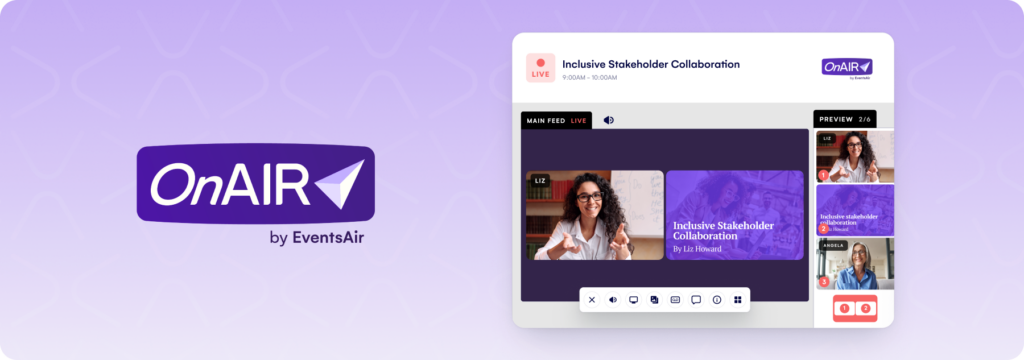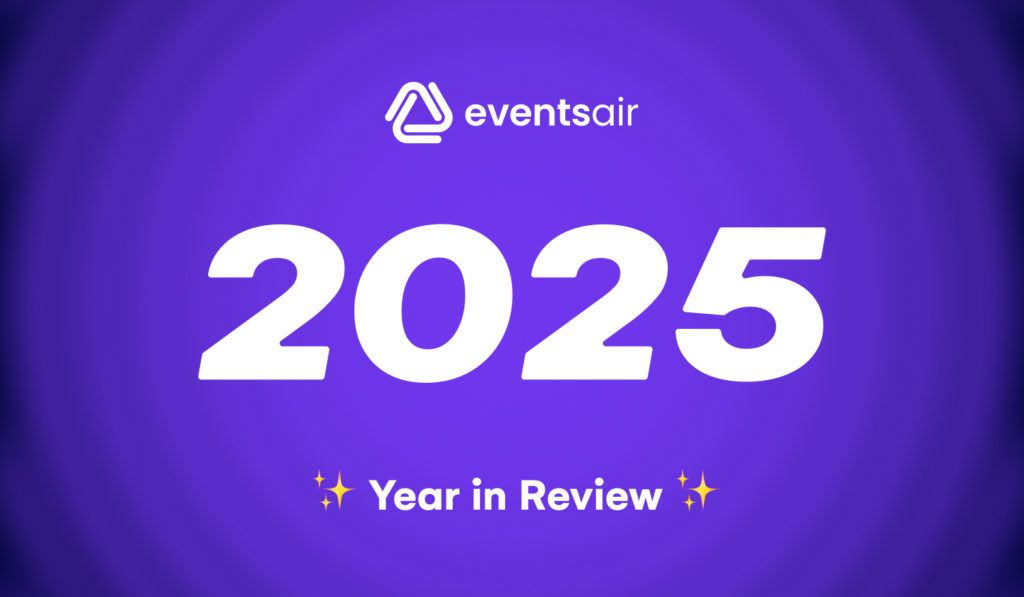
A scientific congress is a gathering of researchers, clinicians, and academics in one space to share breakthroughs, explore new ideas, and challenge each other’s thinking. These events drive science forward through real conversations and evidence-based insights.
But behind the scenes, organizing a congress takes more than just logistics. It requires a clear purpose, tight coordination, and the right tools to keep everything on track, from registration to post-event reporting. When expectations are high, there’s not much room for error.
Fortunately, in this EventsAir article, we break down what a scientific congress really involves and how to plan one effectively. It also highlights how EventsAir helps organizers run events that deliver real impact.
What is a scientific congress?
A scientific congress is a formal event where researchers, academics, and subject matter experts gather to share findings, discuss challenges, and exchange ideas within a specific scientific discipline.
For example, an ecological scientific congress discusses the issues surrounding the environment and its components.
These events may be held in person, online, or in a hybrid format and can range from focused, single-track meetings with under 100 participants to major international congresses with thousands of attendees across parallel sessions.
What happens during a scientific congress?
Irrespective of the format, a scientific congress usually includes activities like:
- Abstract presentations: Oral and poster sessions featuring peer-reviewed research
- Keynote lectures: Talks by leading figures in the field
- Panel discussions: Moderated debates on current issues or controversial topics
- Workshops: Skill-building sessions or deep dives into specific techniques
- Networking sessions: Scheduled opportunities to connect with peers and collaborators
What are the benefits of a scientific congress?
Attending a scientific congress offers a range of valuable benefits for researchers and professionals:
- Present your research to peers: Share your findings and receive constructive feedback from experts in your field.
- Gain insights into emerging trends: Stay informed about the latest breakthroughs, technologies, and methodologies.
- Develop professional skills: Improve key abilities like public speaking, critical thinking, and academic writing.
- Build collaborative relationships: Connect with potential research partners, mentors, and collaborators.
- Increase visibility in the scientific community: Raise your profile among peers, institutions, and potential employers.
- Explore funding and career opportunities: Discover grants, fellowships, academic programs, and job openings.
How to plan and execute a scientific congress
Step 1: Define the objectives and scope
When planning a scientific congress, you will need to start by setting clear, measurable, and achievable objectives.
- Identify the congress’s purpose (e.g., sharing research, encouraging collaboration, shaping policy) and define your target audience. Are you bringing in only academics, researchers, or a mix of both?
- Next, choose a format. You can go in-person, virtual, or hybrid, whichever aligns with both goals and audience needs previously determined.
- With this information, you can come up with a concise scope statement, which outlines:
- Key scientific themes
- Audience and stakeholders
- Event format and duration
- Expected outcomes (e.g., publications, recommendations)
- Budget, resources, and timeline
This initial foundation guides all planning decisions and helps measure the impact of the congress.
Step 2: Assemble the organizing team
You need the right team to plan and execute a successful scientific congress. Build a multidisciplinary team with clearly defined roles to ensure smooth congress execution.
Key roles include:
- Scientific program chair: Leads abstract review and session planning
- Operations lead: Handles logistics, vendors, and venue setup
- Sponsorship coordinator: Secures funding and manages sponsor relations
- Marketing & communications manager: Manages promotions and outreach
- Technology manager: Oversees event tech integration

After assembling the team, set communication protocols and schedule regular check-ins to stay aligned and resolve issues efficiently.
Step 3: Secure venue and set dates
Next, you need to choose a venue that fits your scientific congress format, whether in-person, virtual, or hybrid. The venue must also support the expected attendance and technical needs.
- For in-person and hybrid congresses, select a venue with adequate space, accessibility, and strong tech support. Hybrid venues should also support seamless virtual integration.
- For fully virtual congresses, ensure your platform can handle session streaming, attendee interaction, technical support, and scalability for larger attendee capacities.
You also need to schedule dates that avoid holidays, academic breaks, and overlapping conferences, and prioritize the availability of key speakers to enhance engagement.
Finally, early booking and clear logistics are key to smooth execution, so put all the necessary plans in place. This is even necessary for virtual and hybrid formats – taking the time to choose the right technology partner to support your goals whilst onboarding your team successfully can take time.
Step 4: Develop the scientific program
Create a program that aligns with your congress’s objectives and accommodates a variety of presentation formats.
Start with a targeted call for abstracts, clearly outlining submission guidelines and review criteria. Use a structured peer-review process with defined scoring rubrics to ensure fairness and consistency.
Once selections are made:
- Organize abstracts into balanced sessions by topic and format
- Confirm presenter participation and collect bios, slides, and other materials
- Publish the program on the event website and mobile app
Include tools that let attendees personalize their schedules and engage with content. A well-structured program drives knowledge sharing and a more impactful congress. How can EventsAir help?
EventsAir’s abstract management system streamlines this workflow, from submission to final selection by:
- Allowing authors to submit abstracts through customizable online forms
- Enabling reviewers to access, score, and comment on submissions
- Giving organizers dashboards to track review progress and decisions
- Managing communications with authors about acceptance and next steps
Step 5: Promote and manage registration
The next step is to promote the congress to your target audience.
Start with a focused outreach strategy using segmented email campaigns, academic networks, and social media. To boost engagement and reach, tailor messaging for different audience segments – presenters, attendees, and sponsors – to maximize engagement.
Also, set up a registration process that accommodates various participant types. Ensure the workflow is clear, accessible, and mobile-friendly. Include customizable forms, flexible ticket types, and multiple payment options (e.g., credit cards, digital wallets).
Key considerations:
- Send automated confirmations and reminders to minimize no-shows
- Clearly communicate refund policies and support options
- Monitor registrations in real time to manage capacity and planning
EventsAir supports this step with:
- Custom registration: Easily create tailored registration experiences for different congress attendee types using a drag-and-drop builder. No tech skills are needed.
- Marketing tools: Create branded websites and send targeted, automated emails to boost visibility and keep your congress audience informed.

A well-managed registration and promotion strategy drives attendance and improves the overall congress experience.
Step 6: Execute the congress and evaluate outcomes
Delivering a smooth experience, whether in-person, virtual, or hybrid, takes thoughtful coordination.
- For in-person congresses, focus on venue setup, session flow, and on-site support to keep everything running seamlessly.
- For virtual and hybrid congresses, choose a platform that can handle live streaming, pre-recorded content, and interactive features like live Q&A and polling.
- If you’re hosting a fully virtual scientific congress, look for tools that offer:
- Flexible session formats (live, pre-recorded, or scheduled playback)
- Interactive elements like polling, Q&A, and networking hubs
- Virtual exhibition halls and ePoster sessions to recreate the in-person experience
How can EventsAir help?
EventsAir’s OnAIR platform simplifies it all by bringing content delivery, audience engagement, and virtual networking together in one place. Key features include:
- Live webinars, pre-recorded presentations, and synchronized sessions
- Built-in engagement tools such as Q&A, polls, and networking hubs
- Immersive virtual expo halls and ePosters for a rich attendee experience

After the congress, collect feedback and analyze what worked. EventsAir’s analytics tools help you track attendance, session engagement, and interaction levels, providing clear insights to improve future congresses.
Need some help here? Here’s our guide to conducting an impactful post-event analysis.
Notable scientific congresses around the world
If you’re looking to organize your scientific congress and need some inspiration, taking learnings from leading, international congresses can assist. Analyze their marketing, online presence, tech stack, program, and more, to properly understand their success and how you can replicate this for your own congress.
International Congress of Mathematicians (ICM)
- Organized by: International Mathematical Union (IMU)
- Format: In-person; virtual in 2022
- Highlights: Held every four years, featuring plenary lectures, Fields Medal ceremonies, and major mathematical discussions
International Congress of Psychology (ICP)
- Organized by: International Union of Psychological Science (IUPsyS)
- Format: In-person; virtual adaptations during the pandemic
- Highlights: Quadrennial congress spanning various disciplines within psychology
International Congress of Immunology (ICI)
- Organized by: International Union of Immunological Societies (IUIS)
- Format: In-person; virtual adaptations during the pandemic
- Highlights: Triennial event focused on the latest in immunological research and discoveries
International Congress of Genetics (ICG)
- Organized by: International Genetics Federation (IGF)
- Format: In-person; virtual adaptations during the pandemic
- Highlights: Held every four years, featuring advances in genetics research and biotechnology
IUBMB Congress (Biochemistry & Molecular Biology)
- Organized by: International Union of Biochemistry and Molecular Biology (IUBMB)
- Format: In-person; virtual adaptations during the pandemic
- Highlights: Triennial congress exploring developments in biochemistry and molecular biology
International Geological Congress (IGC)
- Organized by: International Union of Geological Sciences (IUGS)
- Format: In-person; virtual adaptations during the pandemic
- Highlights: Quadrennial congress focused on global geological research and issues
International Botanical Congress (IBC)
- Organized by: International Association for Botanical and Mycological Societies (IABMS)
- Format: In-person; virtual adaptations during the pandemic
- Highlights: Held every six years; explores plant sciences, taxonomy, and systematics
World Congress of Soil Science (WCSS)
- Organized by: International Union of Soil Sciences (IUSS)
- Format: In-person; virtual adaptations during the pandemic
- Highlights: Quadrennial congress centered on soil science and environmental sustainability
International Congress of Pharmacology (WCP)
- Organized by: International Union of Basic and Clinical Pharmacology (IUPHAR)
- Format: In-person; virtual adaptations during the pandemic
- Highlights: Quadrennial event highlighting breakthroughs in basic and clinical pharmacology
International Congress of High Energy Physics (ICHEP)
- Organized by: International Union of Pure and Applied Physics (IUPAP)
- Format: In-person; virtual adaptations during the pandemic
- Highlights: Biennial congress dedicated to high-energy and particle physics
Make every scientific congress count with EventsAir
Planning a scientific congress takes strategy, precision, and the right tools. From defining your goals to executing a smooth hybrid or virtual experience, each step contributes to delivering value to attendees and stakeholders. That’s where EventsAir fits in.
EventsAir supports scientific congresses with features like abstract management, registration workflows, attendee engagement tools, and post-event analytics. Our OnAIR platform is also built for fully virtual delivery, offering the flexibility and structure organizers need.
Schedule a free customized demo with our experienced team to see EventsAir in action today!
Event Planning & Management | Event Technology & Apps
See EventsAir in action
Discover why 12,000+ event professionals trust EventsAir to deliver effortless events, every time.




